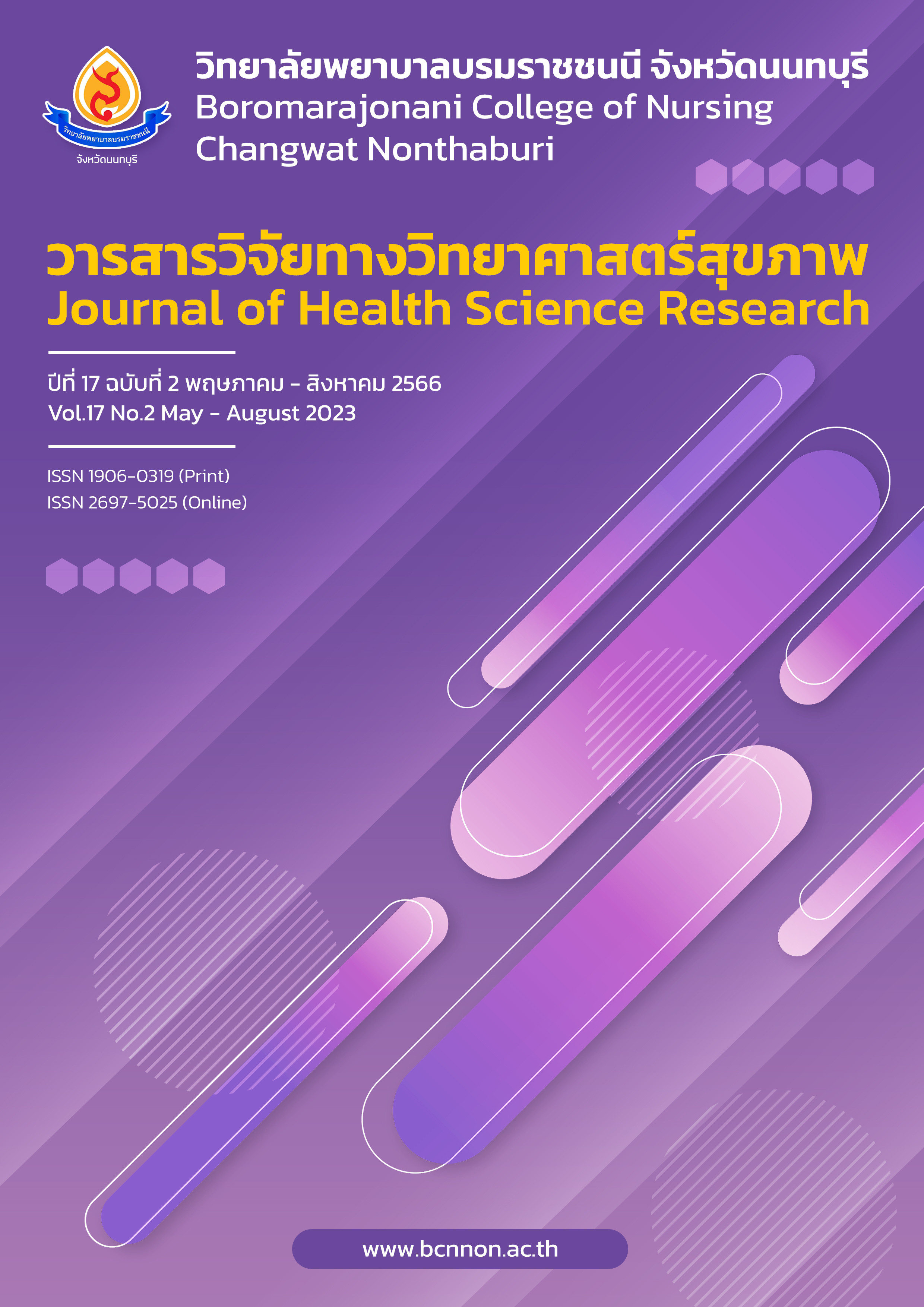การสนับสนุนทางสังคม และปัจจัยอื่นๆ ต่อพลังสุขภาพจิตผู้สูงอายุ
Main Article Content
บทคัดย่อ
บทนำ : พลังสุขภาพจิต คือ ความสามารถของบุคคลในการปรับตัวให้ผ่านพ้นสถานการณ์ที่มีความยากลำบาก ปัจจัยที่สำคัญได้แก่ การสนับสนุนทางสังคมและปัจจัยสนับสนุนต่างๆ
วัตถุประสงค์การวิจัย : เพื่อศึกษาการสนับสนุนทางสังคม และปัจจัยอื่น ๆ ต่อพลังสุขภาพจิตผู้สูงอายุ
วิธีการวิจัย : ตัวอย่าง คือ ผู้สูงอายุ จำนวน 440 คน เก็บข้อมูลโดยใช้แบบสอบถามข้อมูลทั่วไป การสนับสนุนทางสังคม พฤติกรรมสุขภาพ ภาวะซึมเศร้า การรับรู้ด้านสุขภาพ และพลังสุขภาพจิต ระหว่างเดือนพฤศจิกายน 2564 ถึงเดือนมกราคม 2565 วิเคราะห์ข้อมูลด้วยสถิติเชิงพรรณา สหสัมพันธ์แบบเพียร์สัน และการวิเคราะห์การถดถอยพหุคูณ
ผลการวิจัย : ผู้สูงอายุมีคะแนนเฉลี่ยพลังสุขภาพจิต (M=112.58, SD=12.04) การสนับสนุนทางสังคม (M=3.92, SD=.75) พฤติกรรมสุขภาพ (M=3.15, SD=0.87) การรับรู้ด้านสุขภาพ (M=3.75, SD=1.36) อยู่ในระดับสูง ส่วนภาวะซึมเศร้า พบว่า ไม่มีภาวะซึมเศร้า (M=5.11, SD=3.03) ปัจจัยที่มีผลต่อ พลังสุขภาพจิตอย่างมีนัยสำคัญทางสถิติที่ .001 ประกอบด้วย ปัจจัยการสนับสนุนทางสังคม และการรับรู้ด้านสุขภาพ
สรุปผล : การสนับสนุนทางสังคมและการรับรู้ด้านสุขภาพ จะทำให้ผู้สูงอายุมีพลังสุขภาพจิตที่ดี จึงควรศึกษาเพิ่มเติม เพื่อการยืนยันความสัมพันธ์ระหว่างการสนับสนุนทางสังคม การรับรู้ด้านสุขภาพ และพลังสุขภาพจิตผู้สูงอายุต่อไป
Downloads
Article Details

อนุญาตภายใต้เงื่อนไข Creative Commons Attribution-NonCommercial-NoDerivatives 4.0 International License.
บทความที่ได้รับการตีพิมพ์เป็นลิขสิทธิ์ของวิทยาลัยพยาบาลบรมราชชนนี จังหวัดนนทบุรี
ข้อความที่ปรากฏในบทความแต่ละเรื่องในวารสารวิชาการเล่มนี้เป็นความคิดเห็นส่วนตัวของผู้เขียนแต่ละท่านไม่เกี่ยวข้องกับวิทยาลัยพยาบาลบรมราชชนนี จังหวัดนนทบุรี และคณาจารย์ท่านอื่น ในวิทยาลัยฯ แต่อย่างใด ความรับผิดชอบองค์ประกอบทั้งหมดของบทความแต่ละเรื่องเป็นของผู้เขียนแต่ละท่าน หากมีความผิดพลาดใด ๆ ผู้เขียนแต่ละท่านจะรับผิดชอบบทความของตนเองแต่ผู้เดียว
เอกสารอ้างอิง
Akatsuka, E., Tadaka, E. Development of a resilience scale for oldest-old age (RSO). BMC
Geriatr. 2021; 21(174):1-9. doi.10.1186/s12877-021-02036-w
National Institutes of Health. (2017). An aging world: 2015. https://www.nih.gov/news-
events/news-releases/worlds-older-population-grows-dramatically Accessed 24 Jun 2020. (in Thai).
MacLeod S, Musich S, Hawkins K, Alsgaard K, Wicker ER. The impact of resilience
among older adults. Geriatr Nurs (Minneap). 2016;37(4): 266–272. doi.org/10.1016/J.GERINURSE.2016.02.014
Aldwin C, Igarashi H. An ecological model of resilience in late life. Annu Rev Gerontol
Geriat. 2012; 32(1): 115–30. doi.org/10.1891/0198-8794.32.115
Edwards E, Hall J, Zautra A. Elder Care: A Resource for Interprofessional Providers:
Resilience in Aging. [internet]. 2015 [cited 2022 May 18]; Available from: https://www.uofazcenteronaging.com/sites/default/files/resilience_in_aging.pdf
Camilla Callegari, Lorenza Bertù, Ivano Caselli, Celeste Isella, Marta Ielmini, Cristiano Bonalumi, Marco Ferrario, Simone Vender. Resilience in older adults: influence of the admission in nursing home and psychopathology. Neuropsychiatry (London). 2016;6(4):117-123. https://www.jneuropsychiatry.org/peer-review/resilience-in-older-adults-influence-of-the-admission-in-nursing-home-and-psychopathology.html
Fernandez, A. C., Fehon, D. C., Treloar, H., Ng, R. and Sledge, W. H. Resilience in organ
transplantation: an application of the Connor–Davidson resilience scale (CD-RISC) with liver transplant candidates. Journal of Personality Assessment. 2015; 97(5):487–493. DOI: 10.1080/00223891.2015.1029620
Tecson KM, Wilkinson LR, Smith B, Ko JM. Association between psychological
resilience and subjective well-being in older adults living with chronic illness. Proc (Bayl Univ Med Cent). 2019;32(4):520-524. doi: 10.1080/08998280.2019.1625660. PMID: 31656409; PMCID: PMC6793988
Kelsey T. Laird,Helen Lavretsky, Pattharee Paholpak, Roza M. Vlasova, Michael Roman, Natalie
St. Cyr & Prabha Siddarth1. Clinical correlates of resilience factors in geriatric depression. International Psychogeriatrics. 2019;31(2), 193–202. doi: 10.1017/S1041610217002873
Gao Y, Yuan L, Pan B, Wang L. Resilience and associated factors among Chinese patients
diagnosed with oral cancer. BMC Cancer. 2019;19(1):1-9. doi: 10.1186/s12885-019-5679-0. PMID: 31088400; PMCID: PMC6518694
Margaret Wells. Resilience in older adults living in rural, Suburban, and urban areas.
Online Journal of Rural Nursing and Health Care. 2010;10(2):(45-54). doi.org/10.14574/ojrnhc.v10i2.55
Dullius AADS, Fava SMCL, Ribeiro PM, Terra FS. (Alcohol consumption/dependence and
resilience in older adults with high blood pressure. Rev Lat Am Enfermagem. 2018;9 (26): e3024. doi: 10.1590/1518-8345.2466.3024. PMID: 30110100; PMCID: PMC6091391
Laird, K., Lavretsky, H., Paholpak, P., Vlasova, R., Roman, M., St. Cyr, N., & Siddarth, P.
correlates of resilience factors in geriatric depression. International Psychogeriatrics. 2019; 31(2), 193-202. doi:10.1017/S1041610217002873
Parayat, C., Kangchai, W, Somanusorn, S, Predictive Factors of Resilience among Elderly.
The Journal of Faculty of Nursing Burapha University. 2016; 24 (2). 97-106. (in Thai).
Chunsorn N, Kangchai W & Rattanajarana S. Predictive factors of resilience among
of Nursing elderly with diabetes, Journal and Health Sciences. 2018; 12 (2), 12-23. (in Thai).
Silva Júnior EGD, Eulálio MDC, Souto RQ, Santos KL, Melo RLP, Lacerda AR. The
capacity for resilience and social support in the urban elderly. Cien Saude Cole. 2019; 24(1), 7-16. Portuguese, English. doi: 10.1590/1413-81232018241.32722016. PMID: 30698235
Krejcie, R. V., and Morgan, D. W. “Determining Sample Size for Research Activities”
Educational and Psychological Mea- surement. (1970). 30, 607 – 610.
McClain, Jessica; Gullatt, Katelyn; and Lee, Caroline. "Resilience and Protective Factors
in Older Adults". Graduate Master's Theses, Capstones, and Culminating Projects. 2018 [internet]. [cited 2022 May 18]; Available from: 2018; 296.
https://doi.org/10.33015/dominican.edu/2018.OT.11
Toonsiri CH, Hengudomsub P, Chaimongkol N, & Photihung P. Factors Influencing
Resilience Among Community-Dwelling Older Adults with Chronic Illness: A Causal Model Testing. The Journal of Faculty of Nursing Burapha University. 2019; 27(1), 78-88. (in Thai).
Jermthaisong, S., Chaisena Dallas, J., & Hengudomsub, P. Predictive Factors on Resilience
Among Older Adults with Depression Bang Nam Priao District, Chachoengsao Province. Vajira Nursing Journal. 2019; 21(2), 51-66. (in Thai).
Department of Mental Health, Ministry of Public Health, Thailand. Depression
Assessment (9Q). 2021. [internet] Retrieved from https://www.dmh.go.th/test/download/files/2Q%209Q%208Q%20(1).pdf (in Thai).
Grotberg, E. H. What is resilience? How do you promote it? How do you use it? In E. H. Grotberg (Ed.), Resilience for Today: Gaining Strength from Adversity. Westport, CT: Praeger. 2003.
Gooding PA, Hurst A, Johnson J, Tarrier N. Psychological resilience in young and older
adults. Int J Geriatr Psychiatry. 2012 ;27(3); 262-70. doi: 10.1002/gps.2712. Epub Apr 6. PMID: 21472780
Feeney BC, Collins NL. A new look at social support: a theoretical perspective on thriving through relationships. Pers Soc Psychol Rev. 2015;19(2): 113-147. doi:10.1177/1088868314544222
Wagnild, G.M., & Young, H.M. Development and psychometric evaluation of the
Resiliency Scale. Journal of Nursing Measurement. 1993;1(2): 165-178. PMID: 7850498.


